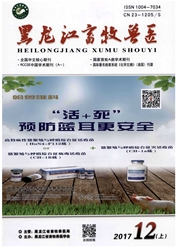

 中文摘要:
中文摘要:
为了探讨金翁止痢颗粒急性毒性、微核率和反复给药的毒性,急性毒性试验采用灌胃法观测小鼠最大耐受量(MTD)和给药后小鼠毒性反应;微核试验采用给药后观察小鼠是否有致突变作用,检测其微核率;反复给药毒性试验采用灌胃的方法对大鼠进行连续给药30d,观察其一般状况、血常规和血液生化指标以及主要脏器的病理变化。结果表明:金翁止痢颗粒的LD50〉20g/kg;微核率均低于4‰,与生理盐水组相比较,差异不显著(P〉0.05);连续给药后,大鼠一般情况良好,体重、脏器指数均无异常改变,血常规及生化指标均在正常范围内,各脏器组织学检查均未见明显病理改变。说明金翁止痢颗粒对大鼠、小鼠无急性毒性、致突变性和反复给药毒性。
 英文摘要:
英文摘要:
To explore the acute toxicity, micronucleus rate and repeated administration toxicity of the Jin Weng Zhi Li granules. The acute toxic- ity test was conducted using the gavage method for the observations of maximum - tolerated dosage (MTD) in mice and the toxicity reaction of the mice after administration; the micronucleus test was also conducted to detect the micronucleus rates for judging the affect of mutation in mice. The repeated administration toxicity test was carried out, and the rats were continuously administrated with Jin Weng Zhi Li granules for 30 days using the garage method, and then were used to observe their general conditions, the changes of blood routine, blood biochemical pa- rameters and pathological changes of major organs. The results showed the LD50 of the Jin Weng Zhi Li granules in mice was greater than 20 g/ kg; the micronucleus rates were less than 4‰, and there was no significant difference ( P 〉 0.05 ) compared with the physiological saline group; the general conditions of the rats were good, and their body weight and organ indexes were normal, and the blood routine and blood bio- chemical parameters were within the normal range, and there were no obvious pathological changes in the histological examinations of various or- gans after continuous administration. The results indicate that the Jin Weng Zhi Li granules have no acute toxicity, mutagenicity and repeated administration toxicity for mice or rats.
 同期刊论文项目
同期刊论文项目
 同项目期刊论文
同项目期刊论文
 期刊信息
期刊信息
